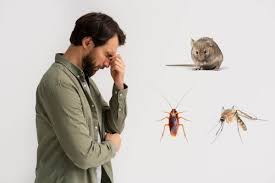When most people think about pests, their first concern is property damage or general nuisance. However, what often gets overlooked is the significant impact pests can have on human health. From allergies and asthma to more serious diseases, infestations can pose real dangers to you and your family. Understanding the link between pests and illness is crucial for protecting your home, your loved ones, and your peace of mind.
The Hidden Dangers of Pests
Pests are more than just an inconvenience; they are carriers of bacteria, viruses, and parasites that can harm human health. Many household pests thrive in environments that allow them to spread pathogens. For example, rodents are notorious carriers of diseases such as hantavirus and leptospirosis, while cockroaches can contribute to respiratory issues and trigger asthma attacks. Even insects that may seem harmless, like ants, can spread harmful bacteria from contaminated areas to your kitchen counters.
Allergies and Respiratory Problems
One of the most common health issues caused by pests is allergic reactions. Cockroaches, dust mites, and rodents shed skin, droppings, and saliva that become airborne and settle in household dust. Exposure to these allergens can lead to sneezing, runny noses, watery eyes, and in severe cases, asthma. Studies show that children living in homes infested with cockroaches are more likely to develop asthma or experience worsening symptoms.
Bed bugs, while not known to transmit diseases, can also cause allergic reactions. Their bites may lead to itching, swelling, and secondary infections if scratched excessively.
Bacterial and Viral Diseases
Many pests are vectors of dangerous diseases. Rodents, for instance, can contaminate food and water with urine or droppings, spreading illnesses like salmonellosis and hantavirus pulmonary syndrome. Flies are another common threat, often carrying bacteria such as E. coli and Salmonella from decaying matter directly onto food surfaces.
Ticks and mosquitoes are well-documented transmitters of viral and parasitic diseases. Ticks are carriers of Lyme disease and other tick-borne illnesses, while mosquitoes spread diseases such as West Nile virus, dengue, and Zika virus. These risks highlight the importance of keeping both indoor and outdoor spaces free from pest infestations.
Food Contamination
Food safety is another critical area impacted by pests. Cockroaches, ants, and rodents can easily infiltrate food storage areas, contaminating supplies with feces, urine, and pathogens. Consuming food that has been exposed to pests can result in foodborne illnesses, often presenting with symptoms such as nausea, vomiting, diarrhea, and stomach cramps.
Restaurants and households alike must prioritize pest prevention to avoid outbreaks of food-related sickness. In fact, public health officials consistently identify pest infestations as one of the leading causes of food contamination incidents.
The Psychological Impact of Infestations
In addition to physical health problems, pests can also negatively affect mental well-being. Living with an infestation can cause stress, anxiety, and even insomnia. The fear of being bitten, the embarrassment of having guests notice pests, or the constant worry about contamination can take a toll on emotional health. This mental strain is a serious but often underestimated consequence of pest infestations.
Preventing Pest-Related Health Issues
Fortunately, there are steps homeowners can take to minimize health risks from pests. Prevention is always the first line of defense. Simple measures such as sealing cracks, keeping food stored properly, and maintaining a clean living environment can go a long way in deterring pests.
Proper Sanitation
Maintaining cleanliness is essential in reducing pest attraction. Regularly wiping down surfaces, disposing of garbage promptly, and avoiding food crumbs or spills can make your home less inviting to pests. Kitchens, bathrooms, and basements are particularly vulnerable areas that require extra attention.
Eliminating Entry Points
Pests often enter homes through small openings around doors, windows, and utility pipes. Sealing these gaps with caulk or weatherstripping helps create a physical barrier against infestations. Installing screens on windows and ensuring doors close tightly are simple but effective steps.
Professional Pest Control
While preventive measures are important, infestations can still occur. When that happens, working with professionals is the safest way to protect your health and home. Services like pest control Dorchester provide targeted solutions to eliminate infestations and prevent them from recurring. Professional technicians have the expertise and tools necessary to address pests efficiently and safely, reducing the risks associated with DIY methods.
For residents, choosing a trusted provider ensures comprehensive solutions tailored to specific pest challenges in the area.
Why Acting Quickly Matters
Ignoring a pest problem can lead to escalating health risks and costly property damage. The longer pests are allowed to multiply, the greater the likelihood of contamination and disease transmission. Acting promptly not only protects your family’s health but also prevents infestations from becoming more difficult, and expensive, to resolve.
About South Shore IPM
South Shore IPM is committed to helping homeowners and businesses create safe, healthy, and pest-free environments. We provide customized Dorchester pest control solutions designed to address current infestations and prevent future issues. Our team uses proven methods to manage pests while prioritizing the well-being of our clients and their properties. Whether you’re dealing with rodents, insects, or other unwanted intruders, we’re here to deliver reliable results you can trust.
read more : How Modern Plumbing and HVAC Innovations Are Shaping Home Comfort

